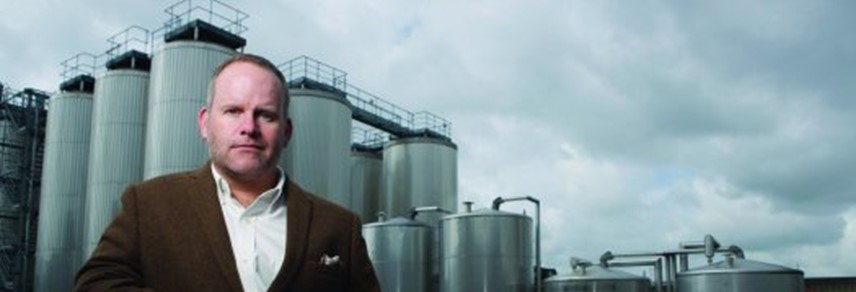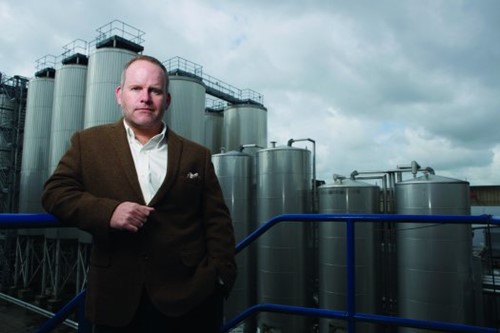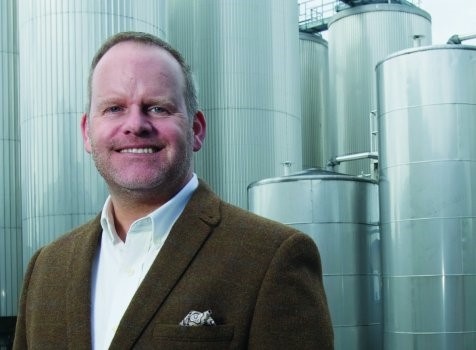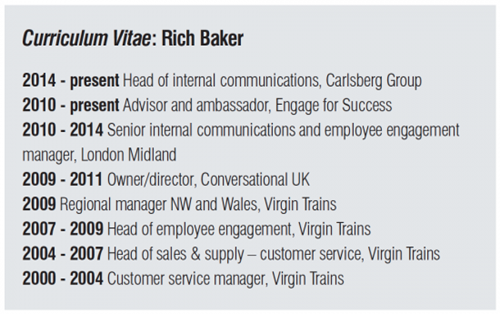
A STORY TO TELL
It’s been a year since Rich Baker was appointed to the internal comms job at Carlsberg. He speaks with Andrew Thomas about his early days at McDonald’s and his career path before heading up internal communications at Carlsberg UK
Photographs by Sam Friedrich
 "I’ve always believed you can get to where you want by working hard, doing the right thing and not compromising on your values,” Rich Baker says. Words which, from many people, would sound glib; a mantra to trot out in a flailing job interview. But when Baker, head of internal communications for Carlsberg UK, tells the story of his career, the authenticity of the axiom is amplified not only by the storyteller’s self-deprecation but by its obvious truth. Baker has worked hard, he’s bright and he’s a genuinely nice bloke.
"I’ve always believed you can get to where you want by working hard, doing the right thing and not compromising on your values,” Rich Baker says. Words which, from many people, would sound glib; a mantra to trot out in a flailing job interview. But when Baker, head of internal communications for Carlsberg UK, tells the story of his career, the authenticity of the axiom is amplified not only by the storyteller’s self-deprecation but by its obvious truth. Baker has worked hard, he’s bright and he’s a genuinely nice bloke.
Baker’s parents had moved to Australia a few years before he was born, but the anticipated idyll of the emigrant life didn’t live up to the reality and Rich, his twin sister, parents, two brothers and sister moved back to the UK when he was two.
It was a working class family. With seven in the house, cash was often scarce, but money was found for purchases deemed important. Baker tells a story of his mother saving her luncheon vouchers for a year so the family could go to the local Chinese restaurant to celebrate her birthday. More importantly, they found the money to buy one of the first home computers, the Sinclair ZX81. “My parents had the foresight to see that computers were going to be important. That early introduction to computers had a massive impact on me, and my subsequent opportunity to learn,” says Baker, “Actually both of my brothers have ended up working in tech and IT.”
It was a close family and Baker enjoyed a happy childhood. He was an above average pupil and did well at school until, when he was 17, his father took a job 150 miles away from their hometown of Wolverhampton. When offered the choice of moving with his parents or continuing his A-levels, on his own, from a rented room in the West Midlands, he chose the latter. Like most 17-year-olds, he found the balance between socialising and studying difficult. Without supervision, it was obvious which would win and the once-promising student found himself with few qualifications, facing university with limited options. “I went through clearing and found myself with two degree choices, product design or leisure management,” Baker says.
He chose the latter, and Baker involuntarily shivers as he remembers his first day, “I was a bit of a rebel, ripped jeans, dreadlocks and so on. I turned up at Buckinghamshire University and everybody on the course, with me being the only exception, wore nylon shell suits. I instantly knew, on that first day, I had made a mistake.” He stuck at it for a year and then spent the next 18 months in a succession of assorted dead end jobs, from picking up flowers to rolling up pieces of chicken on a factory conveyor belt.
At this point, his parents moved back from East Anglia to the West Midlands. Swallowing his pride, the young Baker moved back in with them. Parental pressure forced him to focus. Baker says, “I had no skills, no decent education, I was basically unemployable. But I saw two jobs advertised in the local paper. One was running a nightclub in Wolverhampton and the other working as a crew member in McDonald’s. Which 20-year-old wouldn’t fancy running the nightclub? But my mum and dad said to me, ‘No Richard, you need to do a job with training.’ I ended up taking the job at McDonald’s.”
A crew member is the bottom rung of the McDonald’s career ladder. Baker was flipping burgers. The impact, however, was Damascene. He speaks almost reverentially about the six years he spent at the home of the golden arches. “Maybe less so now, but certainly then it was probably the best kept secret in employment. I joined just before the McLibel trial, and it had a bad reputation as an employer in the UK. There were some great people there who worked hard, but generally it didn’t attract many people with any self-belief. But for some, like me, there was an opportunity to work really hard, get recognised and learn how to run a business.”
Baker is effusive in his praise, “The training is amazing, among probably the best training that I have had. Running a business, marketing, scheduling, training, leadership, process management; I learned so much.”
When Baker started at McDonalds he had no qualifications and no experience. By the time he left in 2000 to take a staff management role at Virgin Group, he was 26 and a deputy general manager in a £6m turnover business, responsible for 120 staff. “For someone like me to have been given that opportunity to progress, purely on my ability and on my potential, is fantastic,” he says.
Virgin had gone into an industry in which, at the time, it had little understanding. With its challenger brand status, it was held in esteem by many. Not so Virgin Trains which, if anything, was held in contempt by its passengers.
Baker’s interview with the director of customer services took place over lunch in the first class compartment of the Wolverhampton to London express. It may have been a train, but dining in first class was the first time Baker had sat down to a meal with more than one knife lain at the table. He was intimidated but whether it had shown or not, he was offered the job.
It was a difficult start. Baker was the first manager to be recruited externally in an organisation where there was already resentment towards the new, inexperienced owners. It was also his first time dealing with trade unions. “It is hard to run a railway,” says Baker. “I managed the safety of the people on board and all of the customer services. I also had to know to some degree how the trains worked, remember the routes they took and so on. It was quite complicated, but of course the most important aspect was that you had to understand about customer service and about leadership. These were the things I had learned from McDonald’s and from making mistakes but learning from them.”
Early on, Baker discovered a lack of process and won respect from both staff and management by bringing these in. However, he is the first to admit that, coming from a process-driven culture like that of McDonald’s to Virgin Trains was a shock, “I was learning from scratch in many areas. The biggest impact to me though, was how much the staff really cared about the passengers and about giving them good service. They were really passionate about railways too. I don’t think I have seen that all-consuming passion anywhere else I’ve worked, and that was a really interesting experience.”
After a year, Baker moved over to Virgin CrossCountry. Initially doing a similar role, he was then asked to reinvigorate the first class offering. This gave him his first experience in engagement and communications as he had to involve those reporting to him in the decision making process. This coincided with the beginning of his time spent studying, a process that would take six years.
The catalyst for studying was rejection. “I applied for a job as group brand manager for customer services at Virgin Group. I was massively underqualified,” laughs Baker. “I think they interviewed me as a favour really. The interview was at Virgin HQ and I was blown away. It was such an amazing opportunity, and it felt like such a great place to work. I thought I would love the chance to do this job although it was very clear that I wasn’t going to get it. The chap who got it was Michael Murphy, he went on to become group brand manager. I found out he had a master’s degree in business. I obviously had nothing, and I thought if that is the job I want, then that is the qualification I need.” Baker enrolled in the Open University and spent the next six years studying part-time and completing his MBA.
If studying for an MBA is tough, studying part-time while in full-time employment is exponentially tougher. Weekends and free time are a forgotten concept. Baker, for the most part, loved it. “I learned so much,” he says. “Not only a strategic understanding of how an organisation operates, but perhaps more importantly how to translate things into a format that people can understand.”
According to Baker, there were times when it took over his life, “I had no time for anything else, but I’ve always said that I’m fundamentally interested in people and making a difference to other people. In some ways I needed it to take over my life, and I felt a huge sense of achievement at having got it when I’d finished.”
 Baker chose the Open University course for two reasons: because he was able to fit coursework into his calendar, no mean feat for anyone working, and for the intellectual rigour it required. “I definitely think my ability to relate to people at levels within an organisation and understand the different challenges that people face probably did benefit from going to the Open University. Its MBA course is in the top-15 in the world, but it is perhaps viewed as less elitist. However,” adds Baker, “My main motivation for going to the Open University was because that’s what worked.” Studying was one thing, but a few years into his MBA, Baker got the opportunity to apply some of the lessons he’d learned. A job was advertised as engagement manager for Virgin West Coast. Virgin had just started on a pretty ambitious engagement program. Baker made the appointment and went in to run it.
Baker chose the Open University course for two reasons: because he was able to fit coursework into his calendar, no mean feat for anyone working, and for the intellectual rigour it required. “I definitely think my ability to relate to people at levels within an organisation and understand the different challenges that people face probably did benefit from going to the Open University. Its MBA course is in the top-15 in the world, but it is perhaps viewed as less elitist. However,” adds Baker, “My main motivation for going to the Open University was because that’s what worked.” Studying was one thing, but a few years into his MBA, Baker got the opportunity to apply some of the lessons he’d learned. A job was advertised as engagement manager for Virgin West Coast. Virgin had just started on a pretty ambitious engagement program. Baker made the appointment and went in to run it.
“It was a fantastic opportunity and I learned a huge amount about how organisations work about people, about what motivates people, about how people train, about how people engage, about organisational psychology, about human psychology, about how to manage large-scale change projects through people,” he says. “I learned how to coach people. I learnt how to facilitate, all kinds of things.”
Sadly it wasn’t to last. In 2008, the global downturn led to many companies reorganising their structures and placing survival at the top of the agenda. Baker was appointed to regional manager, still at Virgin Trains, heading up the North West and Wales operation.
Baker had responsibility for 200 managers and front line staff, based in North Wales, Chester and Liverpool. It wasn’t really a job that Baker had wanted, but it did give him the opportunity to develop Virgin’s Twitter-based customer services response. In many ways, Baker had to write the manual, “There weren’t many celebrities on Twitter then, maybe one or two companies, a few PR guys, and that was it.
”Although he built a considerable following and clearly enjoyed the social media side of the business, it wasn’t enough. He left to start his own business helping others implement and engage people through social media. It wasn’t to last ,and in 2009, he joined London Midland as senior internal communications and employee engagement manager. The role lasted four years, when due to franchise changes, Baker was made redundant.
He wasn’t unemployed for long. Within two weeks of leaving London Midland, Baker had a number of offers. He then took on the role of head of internal communications at Carlsberg UK, where he has been for the past year. It’s a role he’s clearly enjoying. Carlsberg is the world’s fourth-largest brewer, with 2,000 staff across its 14 sites. As well as running the internal communications, Baker sits on the senior management team.
Despite having finally finished the six year-long odyssey of his MBA, Baker hasn’t slowed down. In 2010, he was asked to join Engage for Success, the employee engagement movement. He also writes regularly on ethical.ly and hiyu.co.uk. He says, “I probably reached my expectations of where I would get to in my career about five years ago and I feel incredibly lucky to have the opportunity to be where I am now and to keep progressing.”
It’s a far cry from those early days flipping burgers, but the values that he had then haven’t diminished. Baker has a real sense of responsibility to help other people and is quick to answer when asked what advice he’d give his 18-year-old self. “Ultimately, things will be alright,” he says. “Work hard and it will be alright.”



